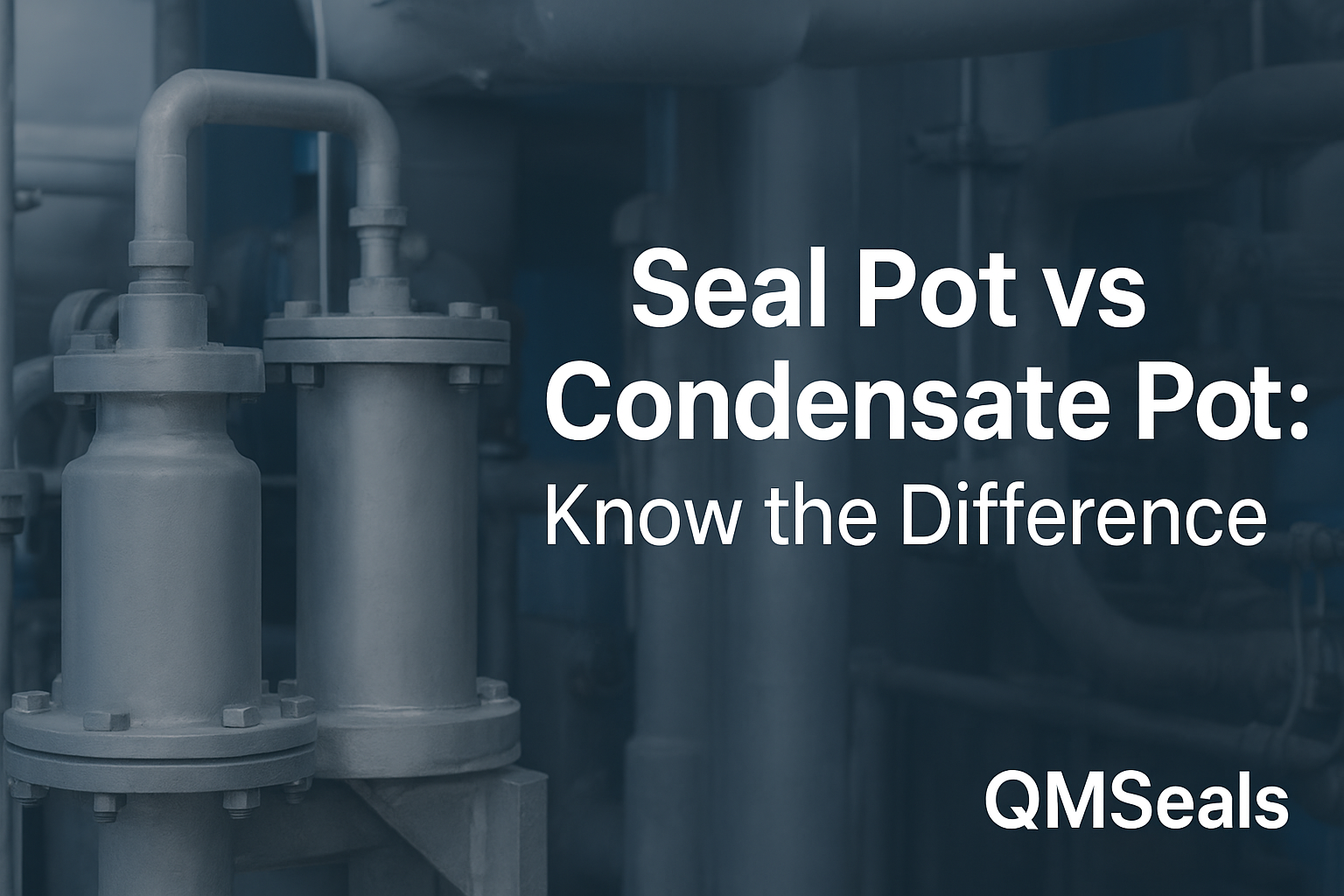Posted At: Oct 03, 2025 - 973 Views

What is the Difference Between Seal Pot and Condensate Pot?
Mechanical seals and pump systems often rely on auxiliary equipment to maintain efficiency and prevent failures. Among these, seal pots and condensate pots play critical roles. Though both serve as reservoirs in pump systems, they have distinct functions, designs, and applications. Understanding the difference between seal pot and condensate pot is essential for engineers, maintenance personnel, and industrial buyers seeking reliable pump performance.
What is a Seal Pot?
A seal pot, also known as a plan 53A/53B tank in mechanical seal terminology, is a specialized reservoir used in centrifugal pumps to supply a barrier fluid to the mechanical seal. This fluid helps in:
- Lubricating the seal faces
- Controlling temperature around the seal
- Preventing dry running
- Protecting the seal from process fluid contamination
Seal pots are commonly used in double mechanical seal systems, particularly when handling hazardous, toxic, or high-temperature fluids. They ensure that the mechanical seal operates efficiently and extends its life. Click here to know more about how the seal pot works.
Applications of Seal Pots:
Chemical processing industries
Oil and gas pipelines
Food and pharmaceutical industries
What is a Condensate Pot?
A condensate pot, on the other hand, is used in steam and condensate systems. Its primary function is to collect condensate (steam that has condensed to water) and provide a seal for instrumentation, control valves, or differential pressure transmitters.
Key purposes of a condensate pot include:
- Protecting instruments from high-temperature steam
- Ensuring accurate pressure measurement
- Removing air or non-condensable gases from the system
- Condensate pots are widely used in:
- Steam boilers
- Heat exchangers
- Steam tracing systems
Key Differences Between Seal Pot and Condensate Pot
| Feature | Seal Pot | Condensate Pot |
|---|---|---|
| Primary Function | Supplies barrier fluid to mechanical seals | Collects steam condensate for instrumentation or process control |
| Fluid Type | Seal fluid, typically water or compatible liquids | Condensate (steam turned into water) |
| Application | Mechanical seal lubrication and cooling | Steam and condensate systems, protecting instruments |
| Industry | Chemical, oil & gas, pharma | Steam power plants, HVAC, industrial heating |
| Design Requirement | Must maintain proper pressure and flow to the seal | Must allow sufficient condensate collection and venting of non-condensables |
Why Understanding the Difference is Important
Choosing the wrong reservoir can lead to:
- Premature seal failure
- Incorrect pressure readings in steam systems
- Reduced efficiency of pumps and heat transfer systems
- Safety hazards in chemical or high-temperature systems
At QMSeals, we provide guidance and solutions for both seal pot systems and condensate pots, ensuring your industrial pumps and steam systems operate safely and efficiently.
Conclusion
While seal pots and condensate pots may seem similar as auxiliary reservoirs, their applications, fluid types, and industry use are very different. Seal pots focus on mechanical seal lubrication and protection, while condensate pots ensure accurate measurement and protection in steam systems. Understanding this difference is crucial for optimal pump and system performance.
For high-quality industrial sealing solutions, pumps, and accessories, trust QMSeals – your partner in reliable pump maintenance and seal management.
Frequently Asking Question
1. What is a seal pot and why is it used?
A seal pot is a reservoir used in mechanical seal systems to supply barrier fluid to seals, ensuring lubrication, temperature control, and protection against process fluid contamination. It is commonly used in double mechanical seal systems in chemical, oil & gas, and pharmaceutical industries.
2. What is a condensate pot and what is its purpose?
A condensate pot collects steam condensate in industrial systems and protects instruments, valves, or transmitters from high-temperature steam. It ensures accurate pressure readings and removes non-condensable gases in steam lines.
3. What is the main difference between a seal pot and a condensate pot?
The primary difference is their function and application. Seal pots provide barrier fluid to mechanical seals in pump systems, while condensate pots handle steam condensate in steam systems for instrument protection and accurate measurements.
4. Can a seal pot be used as a condensate pot?
No. Seal pots are designed for liquid barrier fluid management in mechanical seals, whereas condensate pots are designed for steam condensate collection. Using them interchangeably can lead to equipment failure or inaccurate system readings.
5. How does QMSeals help with seal pot and condensate pot systems?
QMSeals provides high-quality mechanical seals, seal pot systems, and pump accessories that ensure optimal performance, reliability, and safety for industrial pumps and steam systems.


